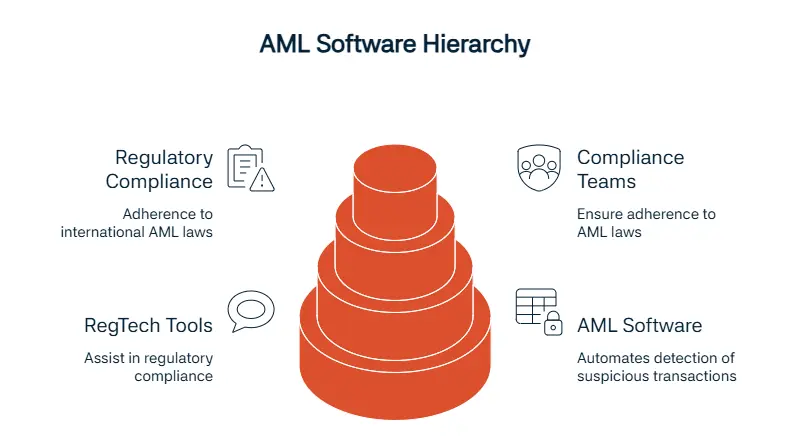What Is AML Software?
There is no doubt that development of software and artificial intelligence continues unabated. They also provide various conveniences in every area of our lives and AML is certainly one of the areas that benefit from these advancements. This shift in AML practices can be seen in a post on Moody’s, which underlines the shift from reactive to proactive AML methods with the help of AI. Nowadays, AML software help detect and report suspicious financial activity; conduct customer screening, transaction monitoring and risk scoring; and also help adhere to regulations such as FATF, 6AMLD and FinCEN. Of course, their benefits are not limited to these, which we will detail in this post.
What Are the Key Key Features of AML Software?
There are a few non-negotiable features that you must check when choosing an AML software. The first one is PEP (Politically Exposed Persons) & Sanctions Screening. Its importance during both before and after onboarding is indispensable. Another crucial feature is Adverse Media Screening, which proves very helpful in identifying reputational risks linked to customers. The next one concerns after the onboarding process: Transaction Monitoring. It is a continuous procedure that can help detect suspicious activity patterns such as structuring, layering, unusual volumes etc. Last but not least, you should not overlook the case management feature, since centralized dashboards can manage alerts, investigations, escalation and reporting.

What Are the Benefits of AML Software?
While it is true that the majority of the tasks that these software seek to handle are manageable through traditional ways, they are far from being as efficient as the software solutions. Automated identity verification, screening and monitoring can reduce your compliance team’s workload. In addition to time saved, they cut operational expenses by requiring a smaller team and minimizing human error. The lack of human error also helps you adhere to regulations successfully, thus a reduced chance of fines, penalties and reputational damage. Lastly, faster onboarding processes can improve customer experience and lessen the chances of quitting during onboarding. According to yahoo finance, the global AML software market is expected to grow with a CAGR of 12.7% from 2025 to 2031 due to reasons such as increasing regulatory compliance requirements, advances in AI and ML, and the increasing risks.

Top Industries Using AML Tools and Solution Providers
Essentially, all industries that are, directly or indirectly, involved in handling large sums of money can benefit from these tools: Banks, financial services, fintechs, digital wallets, cryptocurrency platforms, money transfer and remittance services, insurance companies, gambling, online betting, real estate firms, legal and compliance services, accounting and auditing firms, luxury goods and art dealers…
| Industry | Why AML is Critical? |
| Banking & Financial Services | Prevent illegal money flow. |
| Fintech & Digital Wallets | High transaction volume |
| Cryptocurrency Exchanges & Platforms | Anonymous transactions |
| Money Transfer & Remittance Services | Cross-border transactions |
| Insurance Companies | Especially life insurance |
| Gambling & Online Betting | Large cash flow |
| Real Estate Firms | Property purchases |
| Legal & Compliance Services | Law firms offering trust |
| Accounting & Auditing Firms | Must report suspicious activity. |
| Luxury Goods & Art Dealers | Used in laundering schemes. |
Top 10 AML Software Solutions and Providers in 2025
1. Sanction Scanner
Sanction Scanner, which stands out with an average star rating of 4.8 out of 5 on G2 and 5.0 on Capterra, offers real-time monitoring, risk scoring, seamless API integrations and several other features. Its screening features more than 3000 global sanctions lists, PEPs lists and Adverse Media Data, which get updated every 15 minutes. Plus, Sanction Scanner allows all of this with simple integration and accessible user interface, which can be seen in several customer reviews on capterra.com and g2.com. Despite appealing to all kinds of industries, it is especially a good fit for banks, fintechs, crypto firms and SMEs.
2. ComplyAdvantage
ComplyAdvantage, rated 4.5 out of 5 on G2, is ideal for businesses who prefer a tailored approach. ComplyAdvantage is appreciated for its commitment to innovation and care for customer feedback.
3. IDMERIT
Rated 4.9 on G2, it features a wide array of AML compliance solutions, however IDMERIT particularly excels at identity verification with its global reach, which is based on artificial intelligence and machine learning. Their verification named IDMkyc allows verification under 6 seconds. This way, you can reduce the manual review processes and mitigate the risk of fraud.
4. AMLBot
AMLBot’s focus is rather on crypto businesses. It has a rating of 4.4/5 on G2, which makes it a good contender if you are in a field related to the crypto industry.
5. iDenfy
Rated 4.9 on G2, iDenfy stands out as a reliable option for businesses looking for a KYB solution that covers several AML requirements in a single dashboard. Biometrics and ID scanning for low-risk use cases.
6. AML Watcher
AML Watcher company and it received 4.4 out of 5 on G2. One of its highlights is to be able to successfully integrate human touch into software solutions. The local support for countries in Asia is well but, we can't mention the same situation for MENA, US and Europe markets.
7. MemberCheck
MemberCheck is one of the contenders for AML solution providers. However the subscription based cost is high, license fees are also high. They offer screening, monitoring and risk assestment.
8. AML Core
AML Core is well know AML software provider with being overly complex and not very user friendly. The interface can be confusing for especially new users and support response times are sometimes slow.
9. KYC Hub
KYC Hub is another option that leverages AI in its solutions. It ensures verification under 5 seconds, offers coverage across more than 200 countries and 99.1% accurate AI-powered document verification. According to kychub.com, most of their customers experience 40-55% reduction in compliance costs.
10. KYC3
KYC3 stands out as a highly customizable and cost-effective solution. It is a boutique developer that offers automated compliance processes, comprehensive data mining and analysis solutions for risk management.
| Provider | Pricing Model | Limitations |
| Sanction Scanner | SaaS + Modular API | None significant for its class |
| ComplyFit | Subscription + API | Limited list sources, lacks risk scoring |
| IDMERIT | Abuse of power for personal gain. | Outdated UI, narrow AML coverage |
| AMLBot | Pay-per-use | No traditional AML features, crypto-only |
| iDenfy | Modular SaaS | Not full AML, lacks sanctions data |
| AML Watcher | Usage-based | Not suitable for full AML lifecycle |
| MemberCheck | Usage-based | Weak reporting, low global visibility |
| AML Core | Subscription | Llacks watchlist |
| KYC Hub | SMB-friendly pricing | No monitoring or media screening |
| KYC3 | Pay-as-you-go | Very basic UI, no support for automation |
AML Software Pricing Models
There are various models that you can choose depending on your business’ scope, needs and budget. For example if your business’ workload has several variables, usage-based pricing models (e.g. Per-Transaction, Per-API) would be a better fit for you. However if your expectations are more or less definite, you may go for SaaS/Tiered Subscriptions. There are also options that allow custom/enterprise pricing, which are fully tailored based on your needs.
How to Choose the Best AML Software Provider?
There are numerous things you should watch for when choosing a software for your needs. Specifying your scope regarding risk exposure and compliance is the first thing you should do. That’s to say, there is no one-size-fits-all. However, there are things that you should not ignore regardless of the size of your business. Some of these things are prioritizing real-time screening/alerts, and ensuring global sanctions and media coverage. These are both important for your business and your adherence to the regulations. Also, do not neglect to look up their false positive reduction tools because these can both save your time, and save you from financial penalties as well as reputation damage. Since we’ve already mentioned saving time, another point you must pay attention to is API integration support. Implementation processes can vary for each institution so you should choose one that suits your infrastructure.
Lastly, ensure that the software you choose is reliable regarding SAR/STR reporting and audit trail availability.
AML Compliance Checklist [2025]
Let’s start with must-haves. One of the first things you should check is PEP & Sanctions Screening, since it is also a legal onboarding requirement. Moreover, it can reduce the likelihood of any future risk. Similarly, Adverse Media Screening is crucial thanks to its role in flagging reputational risks. Another requirement is Transaction Monitoring, which will also help you detect suspicious activities in real time. This way, you can be aware of threats before they escalate. In addition to this, do not neglect Customer Risk Scoring, which enables tiered CDD/EDD. Also, there will be regular audits that will require you to do proper audit trail and reporting.
Moreover, API Integration plays a key role because it allows seamless system connectivity, thus making everything smoother and more efficient. Last must-have we will talk about is Case Management. With this, you can efficiently centralize investigations.
Now that we’ve covered the must-haves, let’s switch to nice-to-have options. The first one we will talk about is Graph Analytics. This matters because it allows to identify Ultimate Beneficial Owner/shell structure visualization. It is immensely important in revealing the ultimate owners, thus allowing to see the potential threats beforehand. Also, you can utilize Real-Time Dashboard in order to have the possibility of fast oversight and action.
We must again underline the importance of acting in real-time in AML efforts as we mentioned above. We should also add that, especially when dealing with global users, having Multi-language Screening is a huge plus. Last but not least, having Custom Risk Scenarios can prove very helpful for industry-specific compliance flexibility. These all features can save you time, screen better and helps contextualize the information.
FAQ's Blog Post
A tool that helps detect, prevent, and report financial crime to meet compliance regulations.
Because regulatory scrutiny and fines have increased—software is essential for risk reduction.
Anywhere from $500 to $10,000+ per month, depending on features, scale, and usage.
Transaction volume, feature depth, jurisdictions covered, and scalability needs.
Banks, fintechs, crypto exchanges, gambling sites, PSPs, real estate, and law firms.
Per-transaction/API, SaaS subscription (monthly/annual), tiered packages, and custom enterprise pricing.
Match features with your industry, compliance region, transaction volume, and future growth plans.



